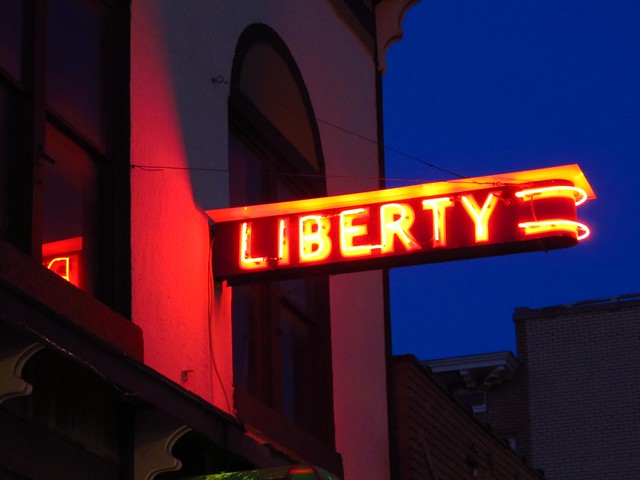 Reposted from Inside Higher Ed; photo courtesy of Jasperdo
Reposted from Inside Higher Ed; photo courtesy of Jasperdo
I’ve been giving a lot of my Twitter feed a raised eyebrow lately. No, it’s not at all likely that electors will denounce Trump and vote differently. Huh, that must-read thread seems kind of dumb. No, I don’t think calling for recounts is a great idea just after we kept insisting the vote couldn’t possibly be rigged.
And then there’s the Russian thing. I think it’s extremely likely Putin has tried to influence our election. I think it’s almost certainly true that WikiLeaks collaborated in playing up emails from Democratic Party folks that contained unappetizing recipes for making political sausage. I think Putin is an appalling dictator who has journalists killed and is fleecing his country while suppressing dissent viciously. I think those uniforms his palace guard wears are tacky souvenirs of a not-so-glorious imperial past. And yes, it troubles me that our new president looks up to him.
But what really bothers me isn’t what Russia did. We do it to other countries all the time, sometimes at a small scale, sometimes disastrously. We shouldn’t meddle in other countries’ elections, and neither should Russia. But the actual meddling was pretty minor stuff. Embarrass a candidate. Give fuel to her enemies. Get the press distracted so they don’t put resources into covering more important news. None of this would have amounted to foreign influence if a large number of our citizens weren’t already looking for a strong man candidate who promised he could change things back to some mythical past.
John Warner has written here about how badly we need our institutions – the ones that have been undermined deliberately. This has been going on for a long time, and it has contributed to a culture where expertise is suspect, the media is lying, the government is always suspicious, academics belong on watch lists, and once-public things like public schools and public higher education are defunded or privatized. But it’s not just distrust of particular institutions. Many people simply don’t believe in our system anymore. In part, it’s neoliberal economic policies playing out with their scorched-earth austerity policies becoming too much for ordinary people to bear. In part, it’s discomfort with an America that seems different, more diverse and more outspoken. We know fewer people who aren’t like us than we did when we attended the same schools and didn’t have our social connections curated for us by advertising companies that want us to click a lot. So the election surfaced a yearning to blow stuff up and turn the clock back to make America the country of fond memory that it never really was.
At bottom, I suspect it’s because many Americans aren’t really that into democracy. Freedom, yes – defined as not having bossy people limit your personal right to do what you want. The idea of liberty is popular. But we’re not always keen on democratic processes working in their messy way toward some collective arrangement that will benefit all of us. We’re not happy when we’re feeling as if we had to surrender some of our privileges because people who aren’t like us raised the issue of unfairness and made us uncomfortable. We’re not invested enough in our systems to even bother voting much of the time. The great winner of this latest election is “shrug,” which earned more significantly more votes than either of the major candidates.
(Though not everyone who didn’t vote was in favor of shrug. In many states, Republicans have spent a lot of energy ensuring people who aren’t likely to vote for them can’t vote at all. There’s something seriously bankrupt about a party that wants to reduce the number of people who are allowed to vote as a winning strategy.)
It’s cold comfort, but I sometimes tell myself we’ll get through this moment of peril because we have before, and (just barely) in my lifetime. We tend to think of McCarthyism as an aberration, a strange era when a bully used his pulpit to do un-American things, but a 1954 Gallup poll found half of Americans sided with Joe. Only a minority opposed him, and the Chief Justice of the Supreme Court speculated that if the Bill of Rights were put to a vote, it would be defeated.
Then, just a decade later, we passed the Civil Rights Act.
So I waver between despair and hope. Hope, because we have overcome moments in our history that we look back on with dismay. Despair because our history is so full of those moments. Maybe we really aren’t better than this. Or maybe we could be, again, at least until then next time.